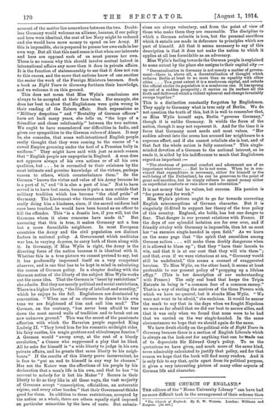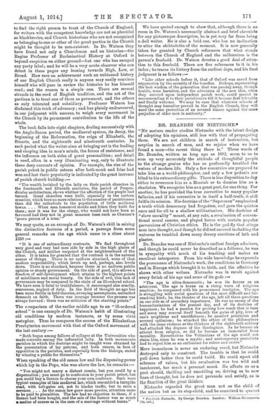THE CHURCH OF ENGLAND.*
THE editors of the "Home University Library" can have had no more difficult task in the arrangement of their scheme than • The Church of England. By E. W. Watson. London: Williams and Norgate. [1s. net.]
to find the right person to treat of the Church of England, for writers with the competent knowledge are not as plentiful as blackberries, and Church historians who are not recognized as belonging to one or other of the great parties in the Church might be thought to be non-existent. In Dr. Watson they have found not only a Churchman and an historian—the Regina Professor of Ecclesiastical History at Oxford is beyond suspicion on either ground—but one who has escaped any party label ; and he will be a very acute observer who can detect in these pages any leaning towards High, Low, or Broad. How rare an achievement such an unbiassed history of our English Church really is anyone may easily convince himself who will pass in review the histories he has himself read ; and the reason is a simple one. There are several strands in the cord of English tradition, and the art of the partisan is to treat one of them as permanent, and the others as only tolerated and subsidiary. Professor Watson has disdained this trick of advocacy ; and has plainly endeavoured, in our judgment with success, to weigh every movement in the Church by its permanent contribution to the life of the whole.
The book falls into eight chapters, dealing successively with the Anglo-Saxon period, the mediaeval system, its decay, the beginning of the Reformation, the reign of Elizabeth, the Stuarts, and the eighteenth and nineteenth centuries. In each period what the writer aims at bringing out is the leading and shaping idea in men's minds, the forces of resistance, and the influence on both sides of great personalities ; and detail is used, often in a very illuminating way, only to illustrate these deep currents of opinion. For example, the rise of the parish priest in public esteem after both monk and friar had won and lost their popularity is indicated by the great increase of parish church building
"The wealth lavished by the laity on their parish churches in the fourteenth and fifteenth centuries, the period of Perpen- dicular architecture, shows whither the affection of the people had turned. Great churches were built, especially in the eastern counties, which bore no more relation to the number of parishioners than did the cathedrals to the population of little medieval towns. . . . When men honoured monks and friars they built for them ; now it was for the clergy, who would not have been so favoured had they not in great measure been such as Chaucer's 'poore parson of a toun.' "
We may quote, as an example of Dr. Watson's skill in seizing the distinctive features of a period, a passage from some general remarks on the age which came to a close about 1250
"It is one of extraordinary contrasts. We find throughout very good and very bad men side by side in the high places of the Church, and neither surprised at the neighbourhood of the other. It is taken for granted that the contrast is in the natural course of things. There is no uniform standard, none of that modern respectability, which levels up and, perhaps, also levels down. There is no standard, because there is no uniform public opinion or steady government. On the side of good, this allows a. freedom of self-development which attains to the highest points of saintliness and moral beauty. On the side of evil, this lack of governance may be compared to the state of an ill-ordered school. We have seen it fatal to truthfulness ; it encouraged also cruelty, coarseness, neglect of duty. In the field of thought no age has been more fertile in bold theories, sweeping assumptions, unlimited demands on faith. There was courage because the process was always forward : there was no criticism of the starting points."
The comparison of the earlier middle age to an " ill-ordered school" is one example of Dr. Watson's habit of illustrating old conditions by modern instances, or by some vivid metaphor. Thus he compares the course of the Elizabethan Presbyterian movement with that of the Oxford movement of the last century
"Both began among fellows of colleges at the Universities who made converts among the influential laity. In both movements parishes in which the doctrine might be taught were obtained by the presentation of lay patrons, and both causes, in face of opposition in the parishes, and especially from the bishops, ended by winning a public for themselves."
When speaking of the old canon law and the dispensing power which lay in the Pope, who was above the law, he remarks
"Yon might not marry a distant cousin, but you could by a dispensation ; you must go to confession to your parish priest, but you could buy a licence to choose your own confessor. Such were typical examples of this medieval law, which resembled a turnpike road, with toll-gates set, not to hinder traffic, but to raise a revenue. . . . As the canon law grew more precise, attention came to be paid to pluralities. The law had no objection to these, if a licence had been bought, and the sale of the licence was as much
• matter of course as in the case of a marriage without banns." We have quoted enough to show that, although there is no room in Dr. Watson's necessarily abstract and brief chronicle for any picturesque description, he is yet very far from being a dull writer. He is also a bold one, who has no inclination to utter the shibboleths of the moment. It is now generally taken for granted by Church reformers that what stands between the Church of England and the millennium is the parson's freehold. Dr. Watson devotes a good deal of atten- tion to this freehold. There are five references to it in his index ; he traces its history from the earliest days, and his final judgment is as follows
" Like other schools before it that of Oxford was saved from suppression by the security of the benefice. Bishops, representing the best wisdom of tho generation that was passing away, though hostile, were harmless, and the advocates of the new idea, when they entered upon independent parish work, could persist in recommending it to their parishioners till it became first tolerable and finally welcome. We may be sure that whatever schools of thought may hereafter prevail in the English Church, they will need the same protection of an assured tenure against the same prejudice of older men in authority."



































 Previous page
Previous page